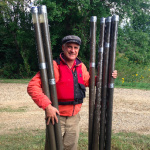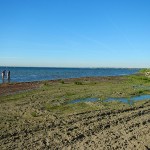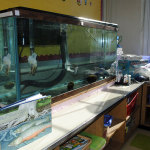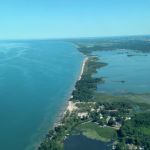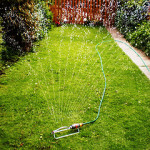Urban drainage, eroding bluffs and muddy water in the Minnesota River watershed—listen up: The river banks in the Minnesota River watershed are made up of sediment that gradually washes away. Erosion is a natural process, but in excess, sediment can block light to plants and smother aquatic life. Now, it’s happening at a surprising pace—with …
Tag Archive: ACSF
Permanent link to this article: http://www.currentcast.org/agricultural-runoff/muddying-the-waters-in-minnesota-rivers/
Nov 22
What’s Up With Muck?
Some pretty stinky stuff is yucking up Great Lakes beaches—listen up. Is it really a coincidence that muck rhymes with yuck? This stinky, slimy stuff looks gross. But what actually do we mean by the word muck? Bretton Joldersma of Michigan’s Office of the Great Lakes, explains that muck is decaying aquatic vegetation and algae …
Permanent link to this article: http://www.currentcast.org/agricultural-runoff/whats-up-with-muck/
Oct 31
Trout in the Classroom
School is in session for these trout: Some students across Pennsylvania are helping raise brook trout in classroom aquariums. And it’s not just a front row seat to the life cycle of the fish. Amidea Daniel of the Pennsylvania Fish and Boat Commission says the students also learn about water quality through hands-on activities – …
Permanent link to this article: http://www.currentcast.org/restoration-and-conservation-initiatives/trout-in-the-classroom/
Oct 09
Lake Ontario’s Best-Kept Secret – Sand Dunes
Scientists work to turn back the sands of time. There’s a stunning 17-mile section of dunes on the eastern shore of Lake Ontario in New York. Formed by glaciers, the dunes protect wetlands, creating habitat for birds and fish. Thirty years ago, unrestricted access led to damage by all-terrain vehicles and over-use. Today, trails and dune …
Permanent link to this article: http://www.currentcast.org/development/lake-ontarios-best-kept-secret-sand-dunes/
Jul 22
The Lawn Ranger Says, “Don’t Overwater, Kids!”
Heigh ho, lawns need less water than most people know! Listen up for some water-saving heroics: Your lawn may look like as dry and thirsty as the Old West—but it probably needs less water than you think. Turns out, most grass grows best with about one inch of water every seven to ten days, and …
Permanent link to this article: http://www.currentcast.org/water-conservation-2/dont-overwater-lawns/

